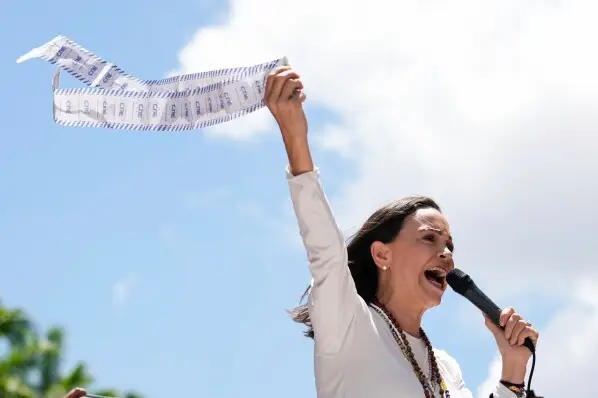In recent years, María Corina Machado has represented the most visible face of the democratic opposition in Venezuela. In her long struggle against the Chavista regime, marked by clashes within the opposition itself, Machado’s political evolution has, in many ways, mirrored the political maturation of the Venezuelan people.
Gone are the calls for electoral abstention and the attempts at alternative means to force Nicolás Maduro’s removal from power, as the desire for change was channeled into demonstrating electoral strength, forcing the authoritarian regime to commit one of the most scandalous electoral frauds in Latin America’s recent political history.
The road has not been easy. Disagreements were momentarily set aside in light of the overwhelming support for Machado’s leadership, validated by the results of the 2023 primary election. The annulment of the July 2024 election results and the ensuing brutal political persecution—with the winning candidate, Edmundo González, fleeing into exile in Spain and Machado forced into hiding—marked the end of the electoral path in Venezuela. In this new stage of political resistance, Venezuelans both inside and outside the country have witnessed the consolidation of Maduro’s autocratic regime, while the rest of the world focuses on dealing with other anti-democratic expressions in Europe and North America.
The abandonment of Latin America, and more specifically, the Venezuelan crisis, once again exposed the political helplessness of Venezuelans, whose leaders are persecuted and driven to evade Maduro’s threats of imprisonment. Moreover, unlike in previous moments of tension between the Maduro regime and the opposition, Venezuelans who participated in the July 2024 presidential election were targeted with fabricated accusations, devoid of any legal basis, as a means of intimidation and punishment against the opposition.
Under these circumstances, and with the new Donald Trump administration, Machado’s efforts have focused on keeping hope alive while maintaining her campaign to pressure the United States, above all, to once again pay attention to and support Venezuela’s democratic transition. The political dynamics of Trump’s second administration remain erratic, exemplified by the tug-of-war between two visions of the Venezuelan conflict within the president’s inner circle, represented by his Secretary of State, Marco Rubio, and his special envoy, Richard Grenell.
While Grenell has favored maintaining a communication channel with the Maduro regime—which early in Trump’s second term led to the release of six U.S. hostages held in Venezuela—Rubio has represented the hardline faction shaping policy toward Venezuela. One of his first negotiations involved the exchange of over 200 Venezuelan citizens deported to El Salvador for ten U.S. citizens held by Maduro’s political regime.
The oscillation between these two figures, both close to the president and therefore influential over his policy agenda, has continued to generate uncertainty about the United States’ definitive role in Venezuela’s situation, particularly regarding the management of oil licenses. These two perspectives have clashed, as seen in the granting and subsequent revocation of Chevron’s licenses, under pressure from Congress.
In this complex scenario, uncertainty has deepened with Trump’s strategic policy shift. The direction taken by Grenell’s talks with Maduro’s inner circle ran counter to the strategy favored by Rubio’s faction. The failure of the negotiations initially launched to secure the release of Venezuelans deported to El Salvador was due to the clashes between Grenell and Rubio.
The start of a military deployment in the Caribbean in mid-August of this year, consisting of air and naval forces, was justified by the Trump administration as a response to drug trafficking activities in the region. However, the nature of the deployment has sparked diverse reactions, ranging from caution to celebration. Skeptics of President Trump’s true intentions stand in contrast to those who hope for an intervention in Venezuela.
The attacks on vessels that the Trump administration claims were transporting narcotics have been met with approval by some and frustration by others who doubt the veracity of the accusations against those who have perished in these attacks, which have already resulted in 21 fatalities. In this context, Venezuela has once again captured the administration’s attention—but this time from a very different perspective than during Trump’s first term.
The awarding of the 2025 Nobel Peace Prize to María Corina Machado represents recognition of her political trajectory, the maturity of her leadership, and the resilience of the Venezuelan people. The challenge she now faces, as the most visible face of Venezuela’s political struggle, is to continue the process of democratic transition in the country. In granting the prize, the Committee highlighted not only the peaceful nature of Machado’s struggle in defense of Venezuelans’ democratic rights but also her civic courage.
Machado now needs, more than ever, the support of a president who not only believes himself to be the true deserving recipient of the Nobel Peace Prize, but who is also determined to resolve Venezuela’s situation—this time, through military means.
That said, Machado has an additional mandate, one that Alfred Nobel himself established in his will as a criterion for awarding the prize: the contribution to the unity of the opposition in her country, the opposition to the militarization of Venezuelan society, and the support for a peaceful transition to democracy.
Trump’s strategy may contradict the principles outlined in the award, making it Machado’s responsibility to continue preserving opposition unity while insisting on expanding the Trump administration’s support for Venezuela’s democratic cause—ensuring that the transition remains viable and keeps at bay the possibility of a regime controlled by civilian or military factions alien to the Venezuelan people.














